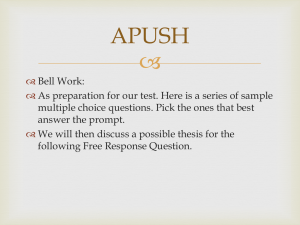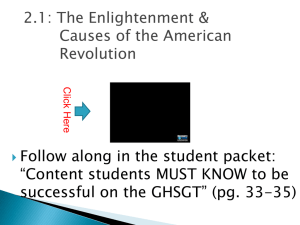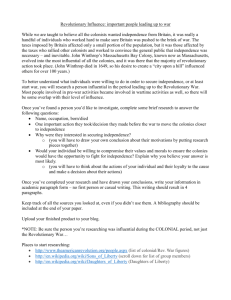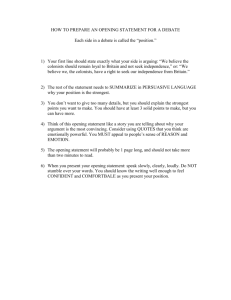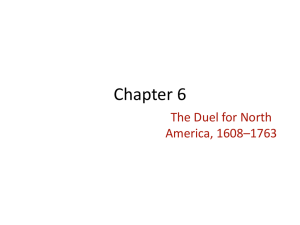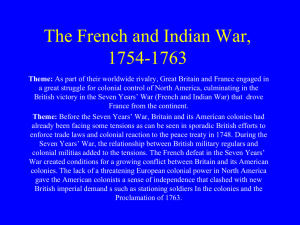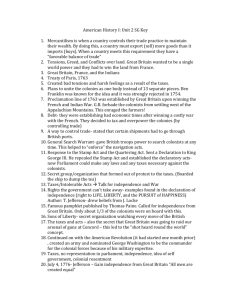SSUSH3-Lecture Notes - Rockdale County Public Schools
advertisement
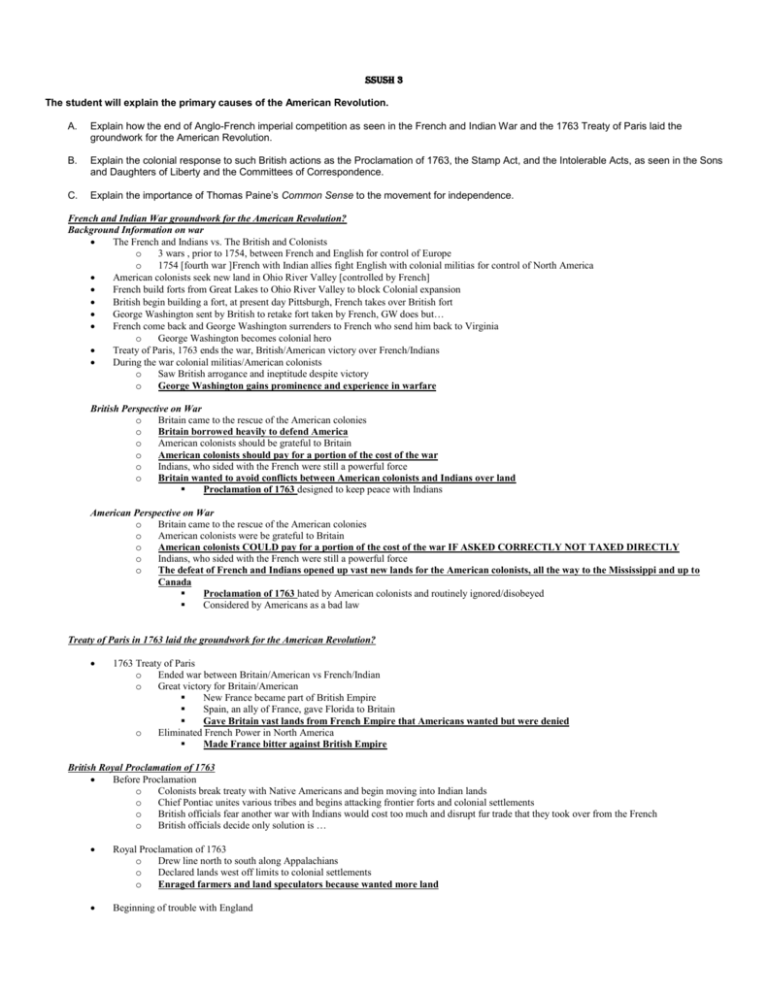
SSUSH 3 The student will explain the primary causes of the American Revolution. A. Explain how the end of Anglo-French imperial competition as seen in the French and Indian War and the 1763 Treaty of Paris laid the groundwork for the American Revolution. B. Explain the colonial response to such British actions as the Proclamation of 1763, the Stamp Act, and the Intolerable Acts, as seen in the Sons and Daughters of Liberty and the Committees of Correspondence. C. Explain the importance of Thomas Paine’s Common Sense to the movement for independence. French and Indian War groundwork for the American Revolution? Background Information on war The French and Indians vs. The British and Colonists o 3 wars , prior to 1754, between French and English for control of Europe o 1754 [fourth war ]French with Indian allies fight English with colonial militias for control of North America American colonists seek new land in Ohio River Valley [controlled by French] French build forts from Great Lakes to Ohio River Valley to block Colonial expansion British begin building a fort, at present day Pittsburgh, French takes over British fort George Washington sent by British to retake fort taken by French, GW does but… French come back and George Washington surrenders to French who send him back to Virginia o George Washington becomes colonial hero Treaty of Paris, 1763 ends the war, British/American victory over French/Indians During the war colonial militias/American colonists o Saw British arrogance and ineptitude despite victory o George Washington gains prominence and experience in warfare British Perspective on War o Britain came to the rescue of the American colonies o Britain borrowed heavily to defend America o American colonists should be grateful to Britain o American colonists should pay for a portion of the cost of the war o Indians, who sided with the French were still a powerful force o Britain wanted to avoid conflicts between American colonists and Indians over land Proclamation of 1763 designed to keep peace with Indians American Perspective on War o Britain came to the rescue of the American colonies o American colonists were be grateful to Britain o American colonists COULD pay for a portion of the cost of the war IF ASKED CORRECTLY NOT TAXED DIRECTLY o Indians, who sided with the French were still a powerful force o The defeat of French and Indians opened up vast new lands for the American colonists, all the way to the Mississippi and up to Canada Proclamation of 1763 hated by American colonists and routinely ignored/disobeyed Considered by Americans as a bad law Treaty of Paris in 1763 laid the groundwork for the American Revolution? 1763 Treaty of Paris o Ended war between Britain/American vs French/Indian o Great victory for Britain/American New France became part of British Empire Spain, an ally of France, gave Florida to Britain Gave Britain vast lands from French Empire that Americans wanted but were denied o Eliminated French Power in North America Made France bitter against British Empire British Royal Proclamation of 1763 Before Proclamation o Colonists break treaty with Native Americans and begin moving into Indian lands o Chief Pontiac unites various tribes and begins attacking frontier forts and colonial settlements o British officials fear another war with Indians would cost too much and disrupt fur trade that they took over from the French o British officials decide only solution is … Royal Proclamation of 1763 o Drew line north to south along Appalachians o Declared lands west off limits to colonial settlements o Enraged farmers and land speculators because wanted more land Beginning of trouble with England British Stamp Act New British tax policies before Stamp Act gets Eastern, New England merchants angry o Britain seeking way to pay for cost of war fought to defend Americans o Britain seeking way to pay for maintenance of British army in colonies to protect Americans o Britain seeking ways to stop smuggling to collect customs duties o Britain starts disregarding colonial rights to due process Stamp Act 1765 o First direct tax on colonists by England o Firestorm of protest – editorials, pamphlets, House of Burgesses and other colonial legislatures pass resolutions promoting colonist’s rights o Organized Stamp Act Congress – issued Declaration of Rights and Grievances “No taxation without representation” o Boycott of British Goods – widespread support of boycott from ‘common people’ British Intolerable Acts Boston Tea Party o infuriated British – last straw for British – Britain determined to end rebellious spirit in the New England colonies Coercive Acts [nicknamed Intolerable Acts] – designed to punish port of Boston, make example for rest of colonies to obey o Shutdown port of Boston till tea was paid for o All Massachusetts government officials to be chosen by governor rather than elected o British soldiers and officials could not be tried in America – immunity o British soldiers must be given access to private homes for lodging o 2,000 soldiers stationed in Boston o All of the above violated traditional British rights of colonists Colonial responses o First Continental Congress Called for a federal government similar to Albany Plan of Union Another Declaration of Rights and Grievances Called for non-importation committees in every county to enforce boycotts of British Goods Called for a Second Continental Congress if British don’t back down Sons of Liberty and the Daughters of Liberty Sons of Liberty o Started by Isaac Sears in Conn. o Spread to every colony o Organized mass meetings and demonstrations o Intimidated Stamp Tax Collectors – burning effigies o Precedent – Spirit of Protest in America Daughters of Liberty o Supported boycott – replaced British goods with homemade goods – ex. British cloth with homemade spun, sassafras instead of tea o British made fun of Colonial women involved in political protests Committees of Correspondence Committees of Correspondence o Formed to inform other colonies of British actions o Quickly inform colonies by using mail/correspondence o Helped colonial leaders organize colonial response to British actions o Helped unify the colonies against Britain Thomas Paine’s Common Sense Best seller in the colonies Dramatically changed public opinion to declare independence Changed public perception of what the problems o o o King George III is problem not Parliament King George III a tyrant and time to declare independence Must dissolve allegiance to King



